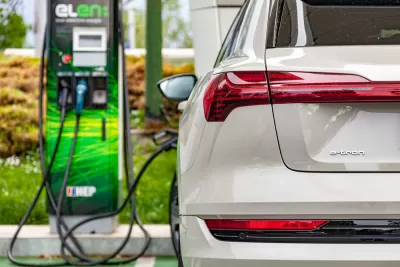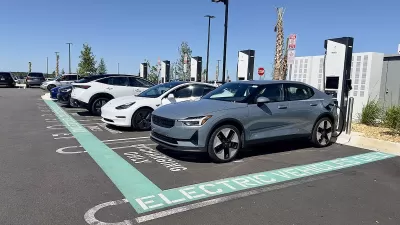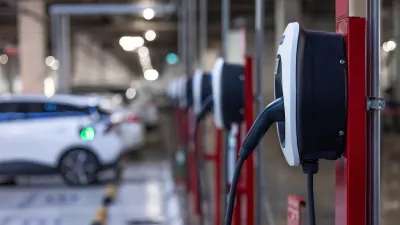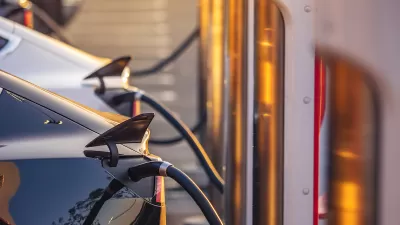The growing popularity of large, heavy SUVS—and the energy needed to produce and operate them—could limit the environmental gains made by electric vehicles.

Experts are warning that the larger size of personal vehicles—even electric ones—poses a risk to the environment, in addition to being more dangerous to pedestrians, writes Kea Wilson in Streetsblog. The warning comes from a European watchdog group, which Wilson points out is notable because cars sold in Europe are generally smaller than U.S. vehicles.
A report called the Green Car Assessment Program rates vehicles on their environmental impact, from manufacturing to tailpipe emissions and charging. “The researchers also controlled for the number of kilometers that vehicle was likely to be driven each year, and offered a free tool for motorists to estimate their cars' unique stats if they drive less than their countries' annual average, or if their vehicles weren't chosen for deeper analysis in this year's rankings.”
When taking into account all the ways a vehicle uses energy, ‘zero emission vehicles’ are, according to the study, “anything but — and large ones, especially, can have fewer environmental benefits than their green marketing campaigns might suggest. Overall, the electric vehicles in this year's dataset only cut between 40 and 50 percent of the greenhouse gas emissions compared to conventional petrol cars, rather than the 100 percent that the famous ZEV label implies.”
As Wilson explains, “any electric car on the road will be roughly 33 percent heavier than its gas-powered equivalent thanks to its heavy battery.” However, “the researchers stressed that Europe's nine percent increase in average vehicle weights on newly sold vehicles over the last ten years was also driven by another factor: the exploding popularity of large SUVs, whose sales increased sevenfold over that period.”
Ultimately, the researchers conclude that “the heavier the vehicle, the more harm it does to the environment and the extra energy required to drive the car.”
FULL STORY: Researchers Are Sounding the Alarm About Heavy EVs — Even in Europe, Where Cars Are Far Smaller

Planetizen Federal Action Tracker
A weekly monitor of how Trump’s orders and actions are impacting planners and planning in America.

Maui's Vacation Rental Debate Turns Ugly
Verbal attacks, misinformation campaigns and fistfights plague a high-stakes debate to convert thousands of vacation rentals into long-term housing.

San Francisco Suspends Traffic Calming Amidst Record Deaths
Citing “a challenging fiscal landscape,” the city will cease the program on the heels of 42 traffic deaths, including 24 pedestrians.

Amtrak Rolls Out New Orleans to Alabama “Mardi Gras” Train
The new service will operate morning and evening departures between Mobile and New Orleans.

The Subversive Car-Free Guide to Trump's Great American Road Trip
Car-free ways to access Chicagoland’s best tourist attractions.

San Antonio and Austin are Fusing Into one Massive Megaregion
The region spanning the two central Texas cities is growing fast, posing challenges for local infrastructure and water supplies.
Urban Design for Planners 1: Software Tools
This six-course series explores essential urban design concepts using open source software and equips planners with the tools they need to participate fully in the urban design process.
Planning for Universal Design
Learn the tools for implementing Universal Design in planning regulations.
Heyer Gruel & Associates PA
JM Goldson LLC
Custer County Colorado
City of Camden Redevelopment Agency
City of Astoria
Transportation Research & Education Center (TREC) at Portland State University
Jefferson Parish Government
Camden Redevelopment Agency
City of Claremont





























